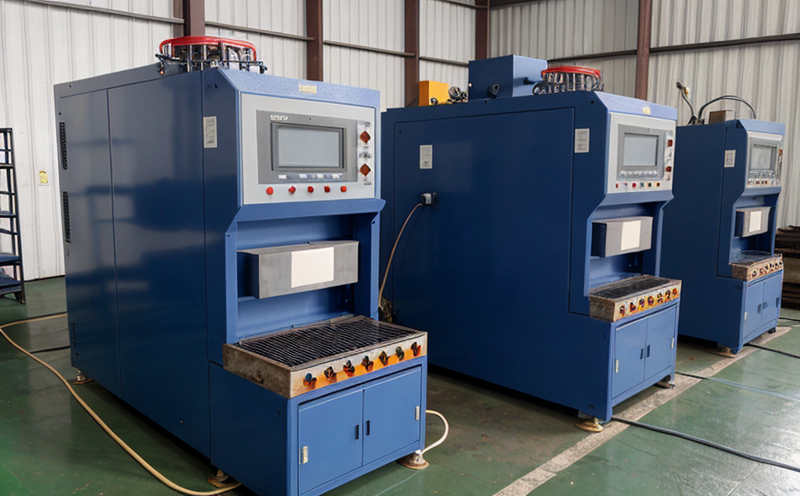GB T1449 Resin Flexural Properties Testing
The GB/T 1449.1-2005 standard specifies the method for determining the flexural properties of resins, including modulus of rupture and flexural strength. This testing is critical in ensuring that raw materials meet specific quality standards and are fit for use in industrial manufacturing processes.
The process involves subjecting a specimen to a three-point bending test under controlled conditions. The specimen is typically a rectangular bar with uniform dimensions specified by the standard. The modulus of rupture (MOR) or flexural strength indicates the material's ability to resist deformation before breaking, while the flexural modulus measures stiffness.
Flexural properties are essential for applications in industrial manufacturing where materials need to withstand mechanical stress without failing. This test is particularly important for resins used in structural components, adhesives, and coatings. Compliance with GB/T 1449 ensures that manufacturers adhere to national standards and specifications, which can enhance product reliability and safety.
The testing procedure involves precise preparation of the specimens, ensuring uniformity across all samples. This includes drying or conditioning the resin under specific conditions before testing to eliminate moisture-related inconsistencies. The test setup consists of a universal testing machine equipped with a three-point bending fixture. Specimens are aligned correctly within the fixture and subjected to controlled loading until failure.
The results from this test provide critical data for quality assurance, process optimization, and material selection. For instance, a higher flexural strength indicates better resistance to mechanical stress, which is crucial in high-stress applications like automotive parts or construction materials.
In addition to the standard GB/T 1449, other relevant standards include ASTM D790 for similar tests on polymers and ISO 178. These standards provide a comprehensive framework that ensures consistency in testing methods across different regions.
Why It Matters
The quality of raw materials directly impacts the performance, reliability, and safety of products manufactured from these materials. GB T1449 testing is vital for ensuring that resins meet specific mechanical properties required by industrial standards. This testing helps in:
- Detecting inconsistencies or defects in raw material supply
- Ensuring compliance with national quality specifications
- Enhancing the robustness and durability of final products
- Supporting research and development efforts to improve material performance
The results from this testing are essential for process optimization, enabling manufacturers to identify areas where improvements can be made. This leads to more efficient production processes, reduced waste, and ultimately higher-quality outputs.
In a broader context, ensuring the quality of raw materials through such tests contributes to overall industrial efficiency and sustainability. By adhering to national standards like GB/T 1449, manufacturers demonstrate their commitment to producing high-quality products that meet customer expectations and regulatory requirements.
Environmental and Sustainability Contributions
The testing of raw materials for flexural properties plays a crucial role in supporting sustainable industrial practices. By ensuring that resins used in manufacturing meet specific mechanical property standards, this process helps reduce the environmental impact associated with substandard or poorly performing materials.
Compliance with GB/T 1449 ensures that manufacturers are using high-quality raw materials, which translates to longer-lasting products and reduced waste throughout the product lifecycle. This, in turn, contributes positively to resource efficiency and energy savings. For instance:
- Materials that pass flexural strength tests are less likely to break or degrade prematurely, leading to fewer replacements and repairs.
- Better-performing materials can reduce the need for additional raw material inputs, thus conserving natural resources.
- The use of consistent quality materials supports recycling efforts by ensuring that products are made from high-quality components that do not compromise on performance during reuse.
Incorporating such testing into manufacturing processes aligns with broader sustainability goals and helps in achieving a more circular economy. By focusing on the quality of raw materials, industries can contribute to global efforts towards environmental stewardship and sustainable development.
Competitive Advantage and Market Impact
Compliance with national standards like GB/T 1449 provides significant competitive advantages in the industrial manufacturing sector. Here are some key benefits:
- Innovation Leadership: Compliance ensures that manufacturers are using high-quality raw materials, enabling them to innovate and develop advanced products.
- Customer Trust: Meeting national standards builds trust with customers, enhancing brand reputation and customer satisfaction.
- Regulatory Compliance: Ensuring compliance reduces the risk of non-compliance penalties and enhances market access in different regions.
- Operational Efficiency: Consistent testing processes lead to more efficient production lines and reduced waste, contributing to lower operational costs.
The ability to demonstrate conformity with GB/T 1449 can be a key selling point for manufacturers seeking to differentiate themselves in the market. It signals to both buyers and regulators that the company takes quality seriously and is committed to delivering reliable products.
Moreover, adherence to such standards contributes positively to the overall reputation of the industry, fostering trust among stakeholders and enhancing market confidence. This can lead to increased market share and better business performance.





